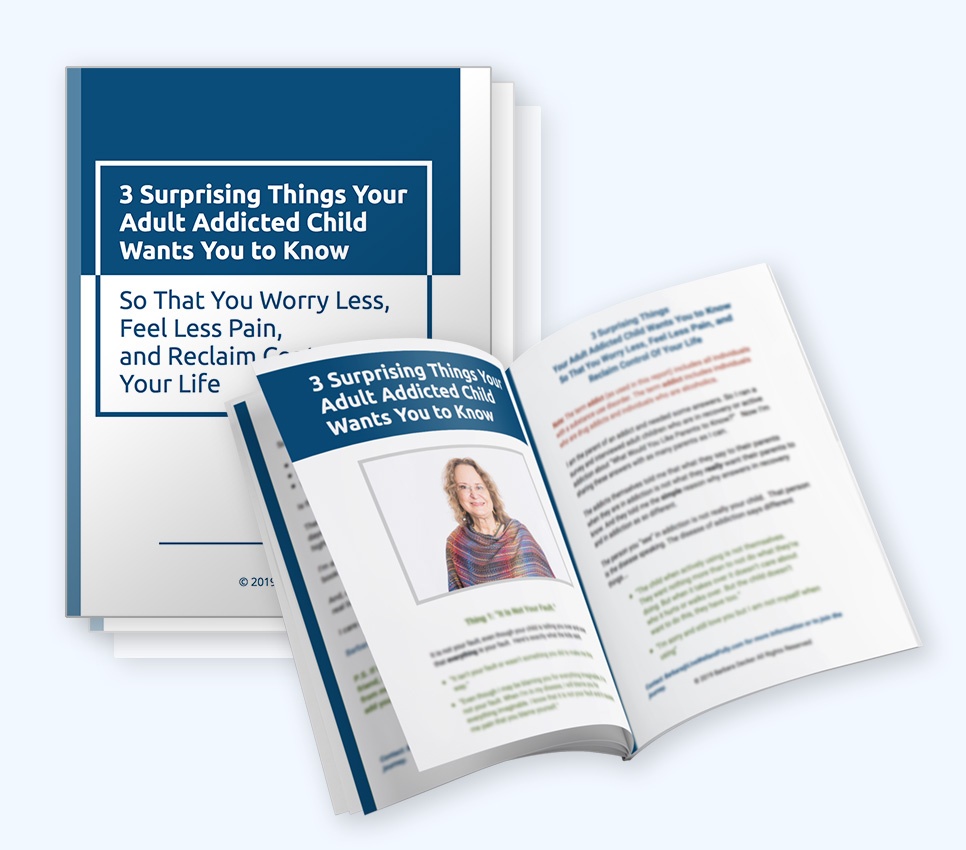3 Surprising Things Your Struggling Loved One Wants You to Know So That You Worry Less, Feel Less Pain, and Reclaim Control Of Your Life
Instant Download
These are the 3 pieces of advice I wish I had known years ago. They would have helped me understand my son, Eric, and this disease of addiction and the impact of mental illnesses.
I know the pain, the worry, and the feeling of helplessness that comes from having a loved one who has an addiction and/or mental illness. (Or is in recovery from an addiction). In my case, the person was my son, Eric. Watch the video above. Listen to my story. Discover why I am so passionate about sharing this information.

There are easy-to-learn strategies out there that allow women to move from one side of this room to the other. From witnessing the first signs of an addicted or mentally ill loved one, to coping with the struggle of relapses, we can find ways to support those we love without sacrificing our spirit... together.
As I watch through the double glass window while my youngest son, Eric, slips back into psychosis, my heart shatters in an instant.
My world completely crumbles around me. The doctors aren't sure if Eric's outburst is caused by psychosis... or the drug use.
Drug use?
How could I not know that he'd been doing drugs so heavily for the past 2 years?
Hard drugs, not just any drugs. Hard drugs.
My once handsome, fit, intelligent, loving son had become an active addict.
I don't know where to start or how to handle any situation close to this. Oftentimes, my pain is constant and intense, and I feel powerless to change things.
But, eventually, I come to discover I am not alone and that there is hope.
I continue to speak with many women who have moved beyond the pain, finding peace and joy. The kind of peace and joy that is not connected in any way to their child’s well-being or the well-being of others in their lives.
I am so inspired by the others I have met on this journey -- what I've termed my recovery-codependent journey -- that I want to connect other struggling women with the same information and inspiration.
I continue to learn as much as I can because there are so many women in need. And today, I want to share some of what I've found with you. I invite you to download the 3 Surprising Things Your Struggling Adult Child Wants You to Know So That You Worry Less, Feel Less Pain, and Reclaim Control Of Your Life as a starting point.
In this downloadable guide, you discover what people who are addicted themselves have to say--and what these people want their moms (and other people who love them) to know.
Now, I know there is so much we feel we can't do... can't control... can't change.
BUT, this is something we can do. We can begin to understand the disease of addiction - the impacts of mental illness - and share our experiences in a supportive, confidential community.
So, click on the button below and I’ll send you this guide 100% FREE...

Your email will remain completely confidential. I’ll also send emails from time to time on related topics - my own stories and experiences, as well as writings that I’ve been told, are really helpful to parents.
Recovery is far different from being “clean” or “not using." When my son, Eric, would come out of jail, the young man I raised would re-emerge... for a day, or two or three. You see, while he was in jail, he was “clean” so the drugs were out of his system. However, soon after being released, Eric fell back into the addiction mindset and began to use again. I asked my therapist how this could be. He was CLEAN after all.
My therapist told me that Recovery takes much more than just being “clean” or “not using."
Recovery is the work of changing this addiction mindset to prevent future use. Until the addiction mindset is sorted, the behaviors that plague our children are much like that of active addiction. Drugs are often used again and hidden from us as parents. Manipulative actions spring up because they continue to need whatever it is now, now, now! There is no real interest in other people or their needs. Eric’s clinician, who is in recovery herself, told me she was working very hard at changing this attitude a full year before her own mind started to clear.
And it is just as important for parents of Adult Children in Recovery to explore ways to strengthen their relationship during this time. We must show our children entirely new ways of being... and empower them even through their struggles. Plus, the time during recovery is a PERFECT time for parents to grow themselves because they'll have more mind-space for this type of work.
We are wise to enjoy the moments when our child is in recovery and to plan for the possible relapse because, yes, relapse is part of recovery. I’ve seen too many parents count on continued recovery and end up devastated when relapse happens.
If your child is in recovery, now is the perfect time to grow your skills in how you engage with your child and show them love in another way.
It can be heartbreaking when all you want to do is help your loved one overcome their addiction, and your offers are ignored, twisted or rebuffed.
You do the research, read the books, and speak with the experts―but why can't you get through? You begin to take on the responsibility of their actions, although you can't make them do anything that they aren't willing to do for themselves.
Sound familiar?
As women, all we want is for for those we love to be happy and healthy. And so, we do everything in our power to love them that way. However, supporting someone with the disease of addiction or a mental illness is just plain different from what we’ve learned our whole lives!
We can no longer trust our Mom Code and Superwomen instincts to guide us to the result we want. Instead, we need to learn to love another way!
When your loved one comes back to you needing something, your instinct is to support them even if it ends up enabling them.
I’ve done hundreds of surveys and spoken to many people with the diseases of addiction and mental illnesses, professionals, and parents who are in the same situation.
I am more convinced than ever, that the community and support of others are absolutely required before most parents can move to a healthy place.
And the real-life results of these women shows why Transformative Boundaries™ is right for you...
...if you are solution-oriented and willing to just try sometime new.
You can get through this.

"Barbara pulled me up when I was drowning!..."
"I was a basket case. Feeling all alone. Lost. Devastated. Now I'm hopeful. I'm much more peaceful because my son is slowly getting it and I'm less stressed."
Patti
Connecticut, USA

"I feel emotionally better on a day-to-day basis..."
"I am very excited to have discovered that there is a process that really makes the boundary setting clear and I can use it whenever I need it. And I feel proud that I can stand up for myself and set boundaries clearly and stick to it. I am more confident that I have my own life, deserve my own happiness and it’s so important to take a step back and let my children grow. I am striving for growth and peace in my life. I feel emotionally better on a day-to-day basis because I am taking the time to think issues over more and not reacting in the moment which has helped with my approach. I am proud that I am now sticking up for my boundaries even though I know I will get defensive backlash, crying and yelling. Oh well – too bad for them. I am confident that I am asking normal requests and my feelings are important and if you can not follow them you do not need to be here."
Cathie**
Pennsylvania, USA

"Wow! I have grown in confidence and courage..."
"I am so grateful that I finally found this course. Now I don’t have to plan my life around my addict anymore. I have learned how to set boundaries and have peace and quiet in my life again. I have even started dating again. I am no longer isolated and drowning in the addict’s chaos. I have my life back and I am not so depressed anymore. The isolation caused so much emotional chaos for me and my grandson. But now we are both happy and healthy again."
Nancy
Ontario, Canada
Q: What I really want to do is help my child. Why do you work on and write about helping me when I’d much rather help my child?
A: I believe with my whole heart that helping YOU is really the only way you can help your child.
Now, this may be a controversial statement, and it’s okay if you see things differently. There is room here for lots of different points of view. This is my belief and it is shared by many recovery professionals and by many of our addicted children as well. There is nothing I can do that will directly get your child into recovery/
There are very real, simple things I can share that will help you! And by helping you, by changing you, your give your child the gift of opportunities to choose recovery.
Q: You talk a lot about boundaries, Transformative Boundaries™. I am worried that boundaries of any kind will push them away from me or cause him more harm.
A: Never jump into setting a boundary that doesn’t feel right for you at that point in time.
Choices are not “right” and “wrong”. The best choices are the ones that are right for YOU, at that point in time. And as you consider each boundary, you’ll be surprised to discover all the options you do have. Often, it feels like black and white; yes or no. Usually, though, there are often a number of options available which are really shades of gray. You are always in charge of the boundaries you choose to put in place and when you choose to do so.
Q: You said several times that you were at peace long before your son entered recovery. Will you talk more about that, because it seems impossible?
A: It seemed impossible to me at first also. I didn’t get to peace all at once, and it wasn’t like being hit by a lightning bolt and suddenly being at peace.
A part of this transformation is really believing that my worth and value as a person are not dependent on my son’s health. That I am a “good enough” parent. That I didn’t cause his disease. And that I can’t fix it. But I can still be happy in my own life, no matter what is happening in his. Stay with me - join the journey and conversation. This transformation is possible for you too.
There are easy-to-learn strategies out there that allow women to move from one side of this room to the other. From witnessing the first signs of an addiction or mental illness, to coping with the struggle of relapses, we can find ways to support those we love without sacrificing our spirit... together.
